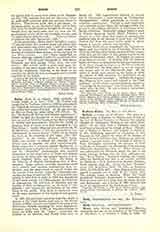

Boece (also BOYCE and BOETHIUS), HECTOR, chronicler and one of the founders of the University of Aberdeen, b. at Dundee c. 1465; d. 1536. At Paris he was a student, then Bachelor of Divinity, and finally a professor at the College of Montaigu, whose course had been reorganized on the principles of monastic poverty and severe routine by James Standone of Brabant, at one time rector of the university. At the college, Boece formed a lasting friendship with Erasmus. From about 1495, Boece was zealously aiding Wm. Elphinstone, the learned Bishop of Aberdeen, to carry out the provisions of a Bull of Alexander VI, obtained at the request of James IV, chartering a university with all faculties in the city of Aberdeen. Finally, in 1505, having received help from various sources, they founded the collegiate church of St. Mary of the Nativity, later known as King’s College, and regular teaching took the place of the occasional lectures of the canons. The organization was modeled upon that of the Universities of Paris and Orleans. The foundation was to support, on meagre stipends, four doctors in the respective faculties, two teaching masters, five student masters, thirteen poor scholars, eight chaplains, and four choristers. Boece was principal and read lectures on divinity and on medicine. History was not regularly taught, but both Elphinstone and Boece made collections of materials. In 1527, Boece received a pension of £50 Scots, and, from 1529 to 1534, a like amount, to be paid annually until he should obtain a benefice of 100 marks Scots. Besides his principalship, he held the offices of Canon of Aberdeen and Rector of Tyrie.
Boece published at Paris, 1522, “Lives of the Bishops of Murthlack and Aberdeen”, about a third of which is devoted to Elphinstone (d. 1514). In 1527 appeared, also at Paris, his “Scotorum Historiae” in seventeen books. Boece was preceded in the field of published Scottish history only by the learned work of Mair. The Scottish translation of this work by Bellenden, in 1536, was later used by Holinshed and thus indirectly by Shakespeare. As a historian, Boece has been praised for elegance, patriotism, and love of freedom; and most severely arraigned, even by contemporaries, for his credulity in the matter of historic origins. His literary honesty, attacked in his own day, has more recently been defended. The impetus which he gave to historical studies at Aberdeen has been of lasting effect.
J. VINCENT CROWNE

